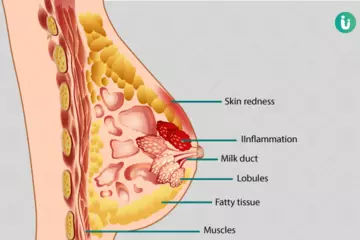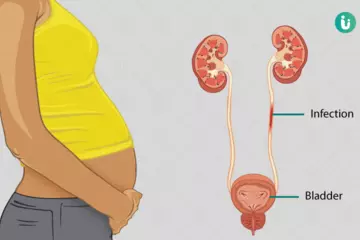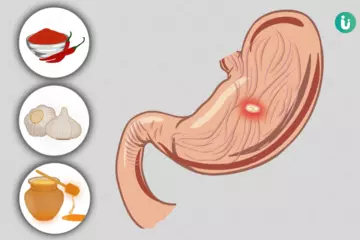What is lactose intolerance?
Lactose intolerance is a condition where the small intestine is deficient of the enzyme lactase required to digest the sugar lactose. Compared to India, it is more prevalent in the East Asian regions.
What are its main signs and symptoms?
Lactose intolerance can result in symptoms like abdominal gas (flatulence), loose stools, oedema (swelling) in the gastric region and nausea.
- Bloating and stomach ache: In the absence of lactase, the undigested lactose moves from the gut to the colon. Though the cell lining in the colon is unable to absorb the undigested lactose, the microflora, a bacteria present in the colon, can ferment and break down lactose and other carbohydrates. This fermentation releases short-chain fatty acids and gases like hydrogen, carbon dioxide and methane, and often leads to problems like stomach ache and cramps. More water and gases in the colon cause distension in the wall of the gut and result in bloating sensations.
- Nausea: Though rare, this distension and bloating can result in nausea and vomiting, too.
- Flatulence: The fermentation of lactose in the colon produces acids and gases like methane, carbon dioxide and hydrogen. The result: increased flatulence.
- Diarrhoea: The microflora in the gut break down the undigested lactose into a waste liquid, gases and fatty acids. The colon absorbs most of the short-chain fatty acids. The leftover fatty acids and lactose increase water quantity in the colon, making the stools more liquidy and frequent.
- Constipation: Constipation is not commonly associated with lactose intolerance but is mostly seen in people with bacterial overgrowth or irritable bowel syndrome. The reason: the methane gas, which is produced during the breakdown of lactose in the colon by microflora, slows down the motion of digested food through the gut which leads to constipation.
What are its main causes?
Lactase is an enzyme present in the stomach which helps in the breakdown of the sugar lactose typically seen in milk and milk products. Lactose intolerance results in improper absorption and an inability to digest lactose. Causes of lactose intolerance may include:
- Gastric and intestinal inflammation
- Parasite infection
- Injury to the gastric lining.
How is it diagnosed?
Your physician may ask about the recent history of illness with symptoms and eating habits, which will provide a proper picture of your diet. Physical examination will be performed. Hydrogen breath test, stool acidity test, and elimination test (used to diagnose food allergies) are some additional procedures which may be performed to confirm the diagnosis.
- Lactose Intolerance Test: To detect whether you are intolerant to lactose or not, the doctor will take your blood sugar before asking you to drink a liquid that is high in lactose. After two hours, you will have to undergo a blood test again to measure the glucose in your bloodstream. The glucose levels in your blood will rise if your body successfully digests the lactose in your blood. However, if the glucose level remains unchanged, then it will signify that you are intolerant to lactose.
- Hydrogen Breath Test: The breakdown of lactose by microflora in the colon releases gases like methane, carbon dioxide and hydrogen. Through the hydrogen test, your doctor checks for lactose intolerance by measuring the amount of hydrogen in your breath after you drink a liquid with high lactose levels. High levels of hydrogen in the breath indicate that you are unable to properly digest and absorb the lactose.
- Stool Acidity Test: This test is mostly done on infants and children. The fermenting of lactose in the colon produces gases and fatty acids. Lactose intolerance can be detected by the presence of these acids in the stool.
What is the treatment for lactose intolerance?
There are no medications that can improve lactose intolerance One can improve the condition just by either reducing the intake of lactose-containing foods or completely avoiding them.
Self-care tips:
- Skipping dairy products entirely can cause a deficiency of nutrients. Thus, it is important to substitute them with healthy alternatives.
- Cheeses may be included in the diet, as they are found to be better tolerated by people living with lactose intolerance.
- Same is the case with butter and cream since they have low levels of lactose. Curd may be helpful since the bacteria in curd tend to lower the lactose levels for energy requirement. You can try and see if they suit you.
- Soy products such as soy milk are usually used as a replacement for dairy products. Although, soy products do not provide the same nutritional value.
- Foods other than dairy that have lactose in them include cookies, cakes, custard, cheese sauce, and bread preparations. When going for grocery shopping, do check the food labels and ensure that the product is lactose-free.
What is the difference between milk allergy and lactose intolerance?
Lactose is a milk sugar but lactose intolerance should not be mistaken for a milk allergy. Milk allergy tends to be more severe, with symptoms like asthma, rashes, eczema, stomach ache, anaphylaxis and diarrhoea.

 Doctors for Lactose Intolerance
Doctors for Lactose Intolerance  OTC Medicines for Lactose Intolerance
OTC Medicines for Lactose Intolerance



















